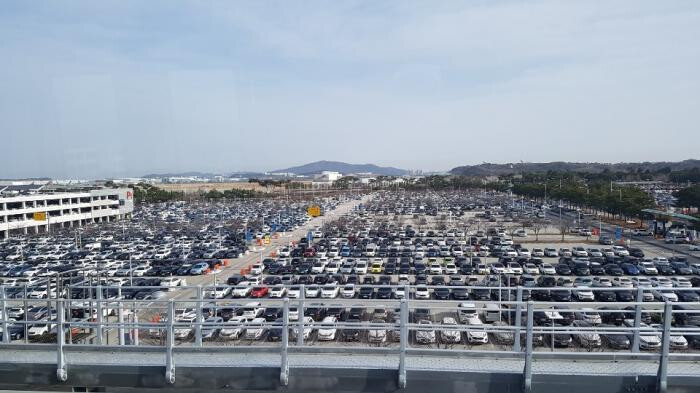
Incheon, South Korea - As South Korea gears up for the highly anticipated Golden Holiday period commencing on May 1st, Incheon International Airport, the nation's primary gateway, is bracing for an unprecedented influx of travelers. Authorities predict an average of over 200,000 passengers will pass through the airport's terminals daily during this peak travel season. While Incheon Airport boasts the largest parking facilities in the country, capable of accommodating 60,000 vehicles, concerns are mounting over potential "parking wars" due to the sheer volume of holidaymakers. This situation has reignited calls for enhanced public transportation options to and from the airport.
The Incheon International Airport Corporation (IIAC) announced on April 30th that a total of 1,482,274 passengers are expected to utilize the airport between May 1st and May 6th, translating to a daily average of 211,753 individuals. This significant surge in passenger numbers, driven by the extended holiday, is already signaling a fierce competition for parking spaces.
IIAC forecasts the parking demand during the May holiday to reach 114.6% of the available capacity. In an effort to mitigate the anticipated shortage, the corporation plans to open temporary parking areas covering 67,000 square meters (approximately 20 acres). These makeshift lots, located at the lawn plaza in front of the passenger terminal, the heliport, and vacant land near the Airport Railroad's Cargo Terminal Station, are expected to accommodate an additional 3,250 vehicles.
On a typical weekday, the parking occupancy rate at Terminal 1 of Incheon Airport, which serves around 180,000 to 190,000 daily passengers, hovers between 85% and 90%. This figure quickly escalates to full capacity ("mancha" in Korean) when daily passenger numbers exceed 200,000, often occurring on weekends. During peak seasons such as summer and winter school breaks, as well as the Lunar New Year and Chuseok (Korean Thanksgiving) holidays, when daily traffic surpasses 210,000, the maximum parking utilization rate can soar to an alarming 128%.
Incheon Airport features an extensive network of eight large parking lots, including five at Terminal 1 and three at Terminal 2, providing a total capacity of approximately 60,000 vehicles. The total area dedicated to parking spans 1.8 million square meters (around 550 acres), equivalent to two-thirds the size of Yeouido, a major island in Seoul.
Despite its impressive parking infrastructure, which surpasses that of many other major international airports in terms of both area and capacity, Incheon Airport consistently grapples with parking shortages during peak travel periods. For context, Dubai International Airport, which handled the highest number of international passengers globally in the previous year at 92.33 million, offers only 7,915 parking spaces. London Heathrow Airport, the second busiest with 79.19 million international passengers, has a significantly larger capacity of 33,000 parking spots. Incheon Airport ranked third globally in international passenger volume last year, with 70.66 million travelers.
The persistent parking challenges at Incheon have led to the proliferation of over 70 private valet parking services operating outside the airport premises in the Yeongjong and Yongyu islands, offering an estimated 2,000 to 3,000 additional parking spaces. Looking ahead, there are growing calls to further expand parking capacity to around 100,000 spaces after the completion of Incheon Airport's ambitious Phase 4 construction project, slated for 2030.
Several factors contribute to the chronic parking congestion at Incheon Airport. These include relatively inexpensive parking fees, the suspension of late-night Airport Railroad services, and the comparatively high cost of limousine bus transportation.
Incheon Airport's long-term parking is priced at 9,000 KRW (approximately $6.50 USD) per day, while short-term parking costs 24,000 KRW (approximately $17.50 USD) per day. Notably, the long-term parking fee has only increased by 1,000 KRW since the airport's opening in 2001, while the short-term fee has actually decreased by 4,800 KRW over the same period. These rates are significantly lower, ranging from 30% to 50%, compared to parking charges at major airports in countries like the United Kingdom and the Netherlands.
The high cost of limousine bus services also exacerbates the parking problem. For instance, a round trip between Seoul Station and Incheon Airport for a family of three on a four-day international trip would amount to 102,000 KRW (17,000 KRW per adult each way). In contrast, driving a private vehicle for the same journey would incur approximately 61,661 KRW, including a 6,400 KRW toll, 20,261 KRW in fuel costs (based on average fuel prices), and 35,000 KRW for four days of long-term parking. This significant cost difference incentivizes driving over utilizing public transportation.
Furthermore, the limited operating hours of the Airport Railroad contribute to the parking demand. The last train from Incheon Airport departs at 11:32 PM, while the first train from Seoul Station leaves at 5:20 AM. Given that Incheon Airport operates 24 hours a day, accommodating numerous flight arrivals and departures during these non-operational hours, as well as many early morning flights between 5:00 AM and 7:00 AM, travelers are often left with no viable public transportation alternative but to drive.
An analysis of Incheon Airport's transportation modal split reveals that private vehicles account for the largest share at 39%. Buses follow at 31%, while taxis and the railway each represent 15% of passenger transportation to and from the airport. This heavy reliance on private vehicles underscores the need for more attractive and accessible public transportation options.
According to an IIAC official, "There are no easy solutions to the parking congestion other than significantly increasing parking fees or actively promoting the use of public transportation such as the railway and limousine buses." This statement highlights the complex interplay of pricing, service availability, and traveler preferences that contribute to the ongoing parking challenges at one of the world's busiest international airports. As the Golden Holiday approaches, travelers are advised to factor in potential parking delays and consider utilizing public transportation if feasible, while authorities grapple with long-term solutions to alleviate the perennial "parking wars" at Incheon International Airport.
[Copyright (c) Global Economic Times. All Rights Reserved.]






























